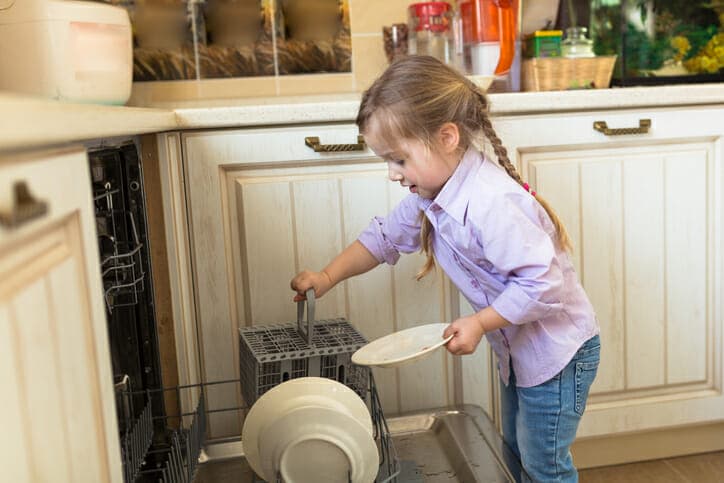
When your children grow up and move into their own homes, they need to have the skills to take care of their home. Teach your children to be self-reliant by giving them chores to do around the house. You may think you are doing them a favor as they get older by taking over the chores, helping them solve their problems, and making sure their lives run smoothly but you are not.
When young adults, living on their own are not self-reliant they run into all sorts of roadblocks. Homes become messy, laundry piles up, and things get lost in the home.
I recently watched a TED talk which emphasized the importance of teaching children to be self-reliant. I know how important this is because, as a professional organizer, I have clients who are not self-reliant. They don’t know how to complete the chores necessary to take care of their homes. They let the chores linger until the home becomes cluttered.
3 strategies to teach children to be self-reliant
1. Involve your children in chores
Start involving your children in household chores when they are very young. Little children can match lids to containers, empty waste baskets, and make their bed.
Children can also put their toys away. Teach them to put one toy away before getting out another. This lets them know that toys have a place to belong and that it’s easier to put things away a little bit at a time.
You can teach categorizing by asking children to find all of one kind of toy and put it away before putting away another. These children’s books illustrate how to teach categorizing through a sweet story.
Do the chores with them at first to model how the chore is done. Then let them do the chore to the best of their ability.
This is important. Do NOT go behind them and fix what they have done. You will completely undermine their confidence and make them feel like their efforts are not good enough.
Praise your children for doing their best. The more your children do their chores the better they will do them.
Here’s an article which lists age appropriate chores.
2. Be helpful
When children are involved in more and more household chores they will automatically start to notice when things need to be done.
Help them to notice that the garbage needs to be taken out when the can is full. It may not be their chore on that day. Praise and reward them for attending to the task without being told (or nagged) to do it.
Taking the initiative at home can translate into initiative at school and then at work. You want to raise children who can notice that something needs to be done and then do it.
This is what Julie Lythcott-Haims refers to as self-efficacy or being self-reliant.
3. Teach your children to be responsible for themselves
As your children get older, they will have more homework assignments and after school activities. Teach your children to prepare for the next day at night before they go to bed.
Ask them what they need to bring with them the next day.
You might ask, “Do you have everything ready to take to school tomorrow?”
It will be hard but try not to list the items for them. Let your children think about the things they need to have with them to support their day on their own.
If they forget something resist the urge to bring it to school for them. Your child will not learn to be self-reliant if you are always coming to the rescue.
Use these three strategies with your children to build self-reliance. Children who are self-reliant are confident. They know that if a problem crops up, they will be able to handle it. Raising confident children is what we all aim to do. It all starts with doing chores at home.
Diane N. Quintana is a Certified Professional Organizer® owner of DNQ Solutions, LLC and co-owner of Release, Repurpose, Reorganize in Atlanta, Georgia. Diane specializes in residential and home-office organizing and working with people affected by ADD, hoarding challenges, and chronic disorganization. For more tips, follow Diane on Facebook.